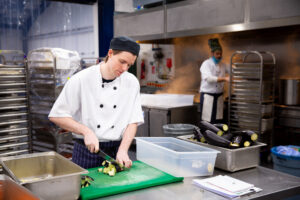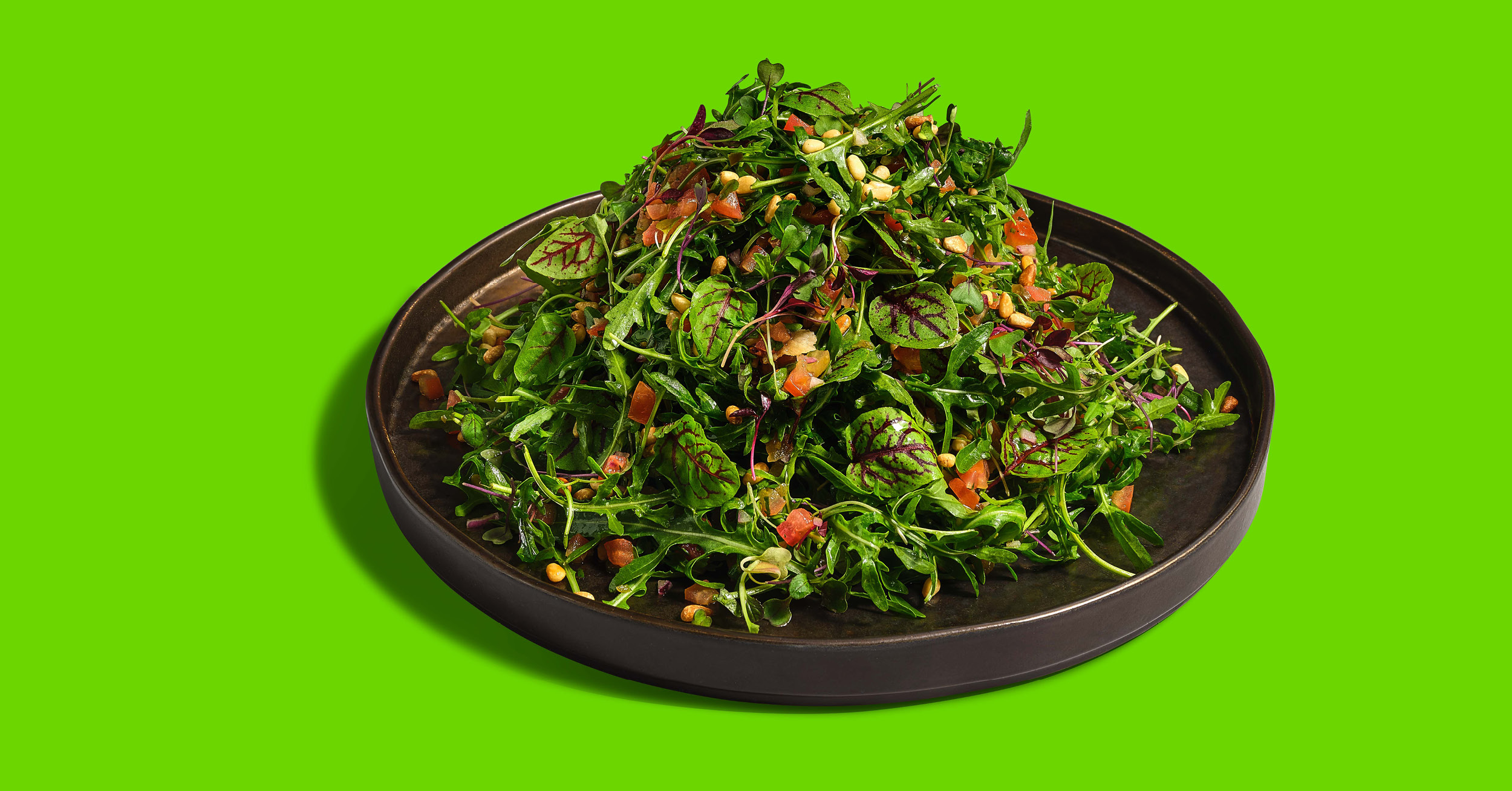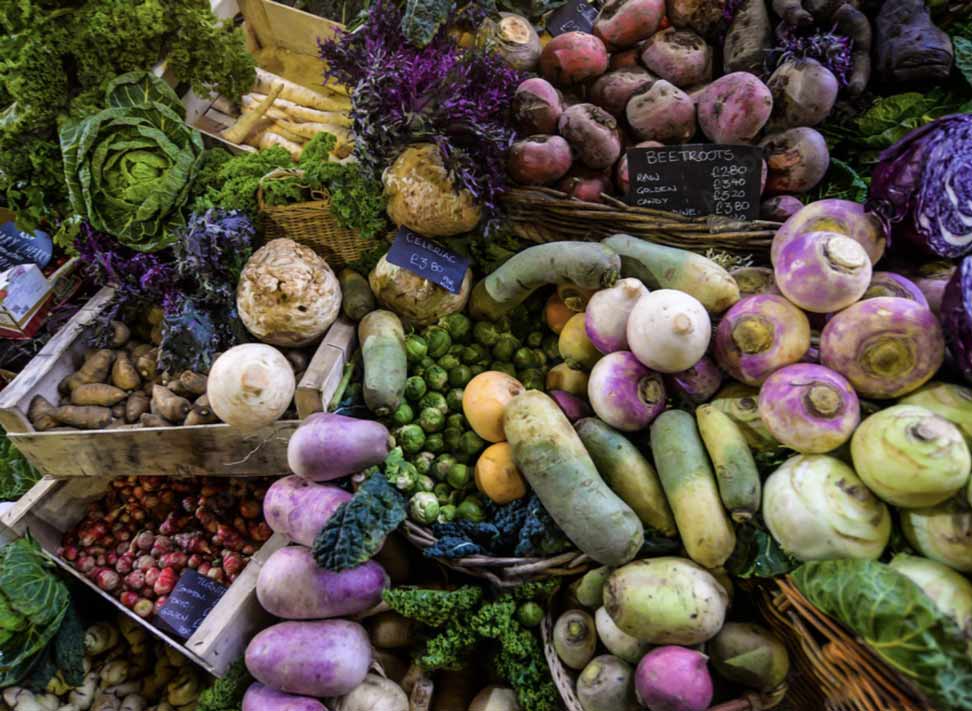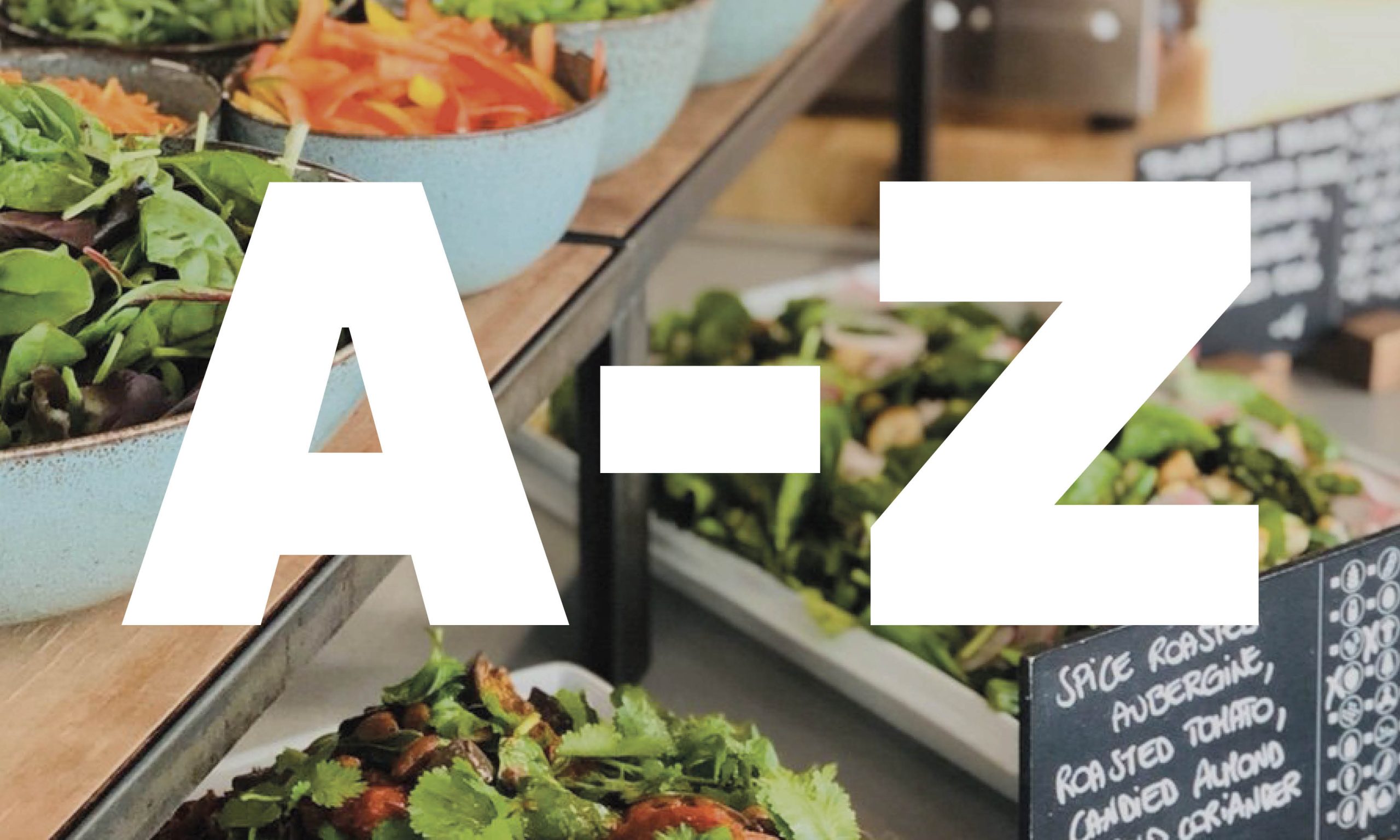Sustainability… It’s a word we hear often these days, especially when we talk about climate change. But it’s more than just a trend. Sustainability is a necessary course of action, accompanied by a range of complex challenges. Fooditude faces its own unique battles, tackling elements within food and catering services that negatively impact the community and environment.
Being able to serve people meals that have a minimal negative impact on the environment is something that the whole team at Fooditude feels very strongly about: from the chefs to the front of house teams.
Before we begin, we’ve noticed something interesting: more people, especially those aged 25 to 35, are really thinking about sustainability at work. Employees are more sensitive to their company’s sustainable practices than ever before.
A Reuters survey revealed that 65% of employees would be more likely to work for a business with “strong environmental policies”.
Trying to get to work on improving sustainability, whether in our personal lives or at work, can feel overwhelming. It’s particularly tricky to eat with the planet in mind, while doubling down on food waste as well.
So, we sat down with Anouk Dijkman, sustainability academic and Fooditude’s previous Sustainability Manager, to better understand how catering can become more sustainable.
Let’s get stuck in…
Defining Sustainable Office Catering
What does sustainable office catering really mean in an urban landscape like London?
Anouk: It’s a challenge, indeed, but one we’re eager to tackle.
For us at Fooditude, sustainability is all about picking the right ways to make and serve food that help our planet and people. This means we focus on farming that’s in tune with nature (agroecology), trying to lower pollution (carbon emissions), using less energy and materials, and making sure nothing goes to waste.
What’s agroecology?
Agroecology is a unique approach to farming that combines the wisdom of nature with sustainable agriculture. It’s all about growing food in ways that work in harmony with the environment, like using natural processes to keep soil healthy and supporting a diverse range of plants and animals.
This approach not only helps in producing nutritious and sustainable food but also takes care of our planet by preserving biodiversity and reducing pollution.
We also care a lot about improving societal health and equity. These ideas are really important to us – they’re the heart of what we believe in when it comes to food sustainability.
Within our current system, it’s tough (if not impossible) to be truly sustainable; it’s a big challenge that takes time. But we’re in this exciting period of change, and we see sustainable catering as becoming more of a way of life, where companies and their people really want to consume food in a way that’s good for everyone and the environment.
Why Sustainability Matters
Corporate sustainability isn’t just a faddy concept; it’s a vital aspect of modern business practices. The climate crisis isn’t going anywhere any time soon, and the race towards Net Zero is everybody’s responsibility, from small business to large corporations, and everyone in between.
“We’ve never seen the level of awareness for climate action and the need for climate impact as we have in the past few years. This is driven by a variety of factors: financial market expectations, new regulations, and new generations of employees and consumers who demand more action from the brands they work for and buy from.”
Source: World Economic Forum
Unsurprisingly, sustainability has worked its way on many board level agendas. Deloitte’s 2023 CxO Sustainability Report: Accelerating the Green Transition, which surveyed around 2 000 C-Suite executives across 24 countries revealed that 42% of CxOs rated climate change as a “top three issue” ahead of seven others, including innovation, competition for talent, and supply chain challenges. In fact, only economic outlook ranked slightly higher.
Food operations can’t be overlooked as part of any business’s sustainability drive… Think food waste (17% percent of total global food production is wasted), how food is sourced, and even transportation. How many times have you ordered from a food aggregator and had it delivered to your door?
While leaders in organisations are aware of how important it is to be sustainable, they often encounter difficulties in weaving these sustainability practices into their supply chain and procurement strategies. This challenge isn’t about a lack of desire to change; it’s more about the complexity of reshaping well-established supply chain systems.
“Companies often struggle with a clear mandate for the sustainability function to engage with procurement on supply chain emissions – they are most often still focused on their direct operational footprint rather than taking a supply chain lens.”
Cynthia Cummis, Director, Private Sector Climate Mitigation, World Resources Institute, and Steering Committee Member, Science Based Targets initiative
That’s why it’s so important for businesses to team up with suppliers that also put a big focus on being sustainable. Sure, you really need to focus on your own sustainability strategy, but part of that strategy should include conscious procurement. Most notably, this falls under Scope 3 of Net Zero.
Wondering what it means?
Scope 3 emissions are the emissions that a business doesn’t directly create but are still a result of its activities. Think of them as the carbon footprint of everything from the production of the products a business buys to how those products are used and disposed of by others. These emissions can come from all kinds of places – like when employees travel for work, or the catering services a business provides for its employees.
When we talk about reaching Net Zero, which means balancing out the amount of greenhouse gases we put into the atmosphere, it’s not just about the emissions we can directly control. It’s also about these Scope 3 emissions that happen because of the things we do and buy.
Understanding and managing these indirect emissions is just as important as reducing the ones your business creates directly, and it’s a big part of the journey towards a more sustainable future.
When every part of a business, including its partners, cares about the environment, it really shows that the company is committed to making a difference, and is actually making a difference.
So, when offering food as an office perk, remember that it doesn’t just have to be a tool for employee engagement, but also a reflection of your commitment to a sustainable future.

Getting Started with Sustainable Catering in the Office
How can businesses start their sustainable office catering journey?
Anouk: From what I have learned whilst I was the Sustainability Manager at Fooditude, here are some great insights and friendly advice for businesses on embracing sustainable office catering practices:
Step 1: Start at the Farm Level – The journey to sustainability begins where our food grows. Healthy soil and farming systems are the bedrock of sustainable food businesses.
Step 2: Internal Practices and Right Suppliers – Mapping out sustainability issues within food systems is crucial. Understand the real impact of your operations, focusing on energy, ingredients, and food production, beyond just the popular topics.
Step 3: Find Supportive Partners – Sustainability in food systems is complex. Engage with experts and peers in the field for valuable insights and support.
How can companies effectively communicate their sustainable catering efforts to their employees and diners?
Anouk: This is an excellent question that all sustainability professionals ask themselves on a weekly basis.
Internally, you will always find a few team members who are already very much interested in certain aspects of sustainability; if you support them in spreading those messages amongst their teams, I think they’re more likely to land as it comes from ‘one of their own team’. Plus, internal sustainability advocates are more likely to keep their colleagues accountable.
Otherwise, casual one-to-one conversations at the coffee machine leave a bigger impression than more formal written content because you can relate it to what that person cares about – there’s also more space for curiosity and friendly debate in those situations, rather than it being top-down.
When sharing stories on our food and ingredients, we regularly invite our suppliers to visit our client sites and directly chat with our diners. Behind most food businesses trying to do better, there are incredibly passionate individuals. There is nobody better than people working in the business to share that enthusiasm.
Technology and Tools for Tracking Food Sustainability
How can businesses keep track of their sustainability journey?
Anouk: Although this can be costly, wider and industry-specific third-body certifications can be helpful to start off with. Here are some specific to catering, and ones we place a great deal of importance on:
- We use the Food Made Good rating by the Sustainable Restaurant Association
- Our carbon emissions reductions are certified by the Planet Mark.
These certifications have guided me to understand the important issues to focus on and how to thoughtfully gather useful information about them for our own sustainable practices and strategy at Fooditude.
Are there specific technologies or tools that can assist in reducing food waste or optimising sustainable food sourcing?
Anouk: The list is endless, from cheap and DIY in-house food waste audits to well-known technologies like Winnow; getting insights into your different waste streams is an excellent first step. There are tons of ways out there to do this! Personally, we’re currently working on developing our own tool due to the unique nature of our business.
On optimising your company’s sustainable sourcing, you can choose suppliers with improved sustainability reporting. I’ve also increasingly come across a couple of integrated catering management platform solutions that include sustainability considerations. There are even companies like Tried & Supplied that specifically have sustainable procurement at the core of their offering.
Challenges and Solutions in Office Food Sustainability
What are some of the biggest challenges faced by businesses when it comes to food sustainability in the office?
Anouk: At Fooditude, there are two big challenges – the cost of good food and handling food waste in offices where things always change.
To tackle these, I suggest making clear plans and goals for being sustainable, choosing the right suppliers, keeping track of pollution from your activities, and really paying attention to where most of your office waste comes from.
Take a look at our 2023/2024 Sustainability Strategy for inspiration.
Practical Steps for Companies to Follow
What are some tangible steps businesses can take to enhance the sustainability of their food programmes?
Anouk:
- Develop a vision for what your ‘ideal’ sustainable food programme looks like – I think it’s crucial that you know what it is you are trying to work towards, and it’s great to come back to if you lose focus.
- Develop sustainability ‘targets’ or ‘missions’ for every team across the company – it’s tough to implement your company’s sustainability yourself, and different groups will have access to operational knowledge you might be missing to implement effective and lasting change.
- When it comes to your suppliers, develop standards that match your environmental and ethical values. This involves choosing suppliers who use practices that are better for the planet, like local sourcing to reduce pollution from transportation, and opting for organic or eco-friendly products.
- Measure your company’s carbon footprint to understand your biggest environmental impacts. While tracking carbon emissions doesn’t show us everything (they don’t capture all forms of environmental impact), it’s a practical way to start making a difference.
- Start by figuring out where most of the waste happens – is it during food prep, with ingredients that go unused, or with leftovers? Knowing this can guide you to waste less and use resources more effectively.
The Role of Collaboration in Achieving Sustainable Catering
The journey towards sustainable catering is not a solo venture. It demands collaboration across the supply chain. Networking and exchanging ideas are crucial in maintaining momentum and making impactful changes.
Anouk: The climate crisis is shared and won’t be fixed by a company’s individual ‘wins’ – the whole system (and its stakeholders) need to change across the supply chain to benefit us all in the long term.
Sustainability within food systems is incredibly complex and includes a list of challenges that sometimes seem never-ending.
It’s challenging to be an expert on all those issues, and collaboration is vital to making effective decisions, as well as having others keep you accountable! In general, commitments like Net Zero require change across the supply chain, so collaboration is a must.
More importantly, working on sustainability can sometimes feel like an overwhelming and isolating task. Having networks to rely on and exchange with is vital in maintaining the energy and drive necessary to make a difference.
Leading the Way in Sustainable Corporate Catering
Anouk: Fooditude stands out because it understands the multifaceted impact of our business on environmental and social issues. We tackle a broad range of challenges, focusing on what truly matters, not just what’s trendy or marketable.
Sustainable corporate catering is a collaborative effort that requires strong partnerships and a unified approach. Fooditude’s underlines this belief, showcasing how collaborations contribute significantly to our sustainability targets.
Strategic Partnerships:
Anouk: Whilst working for Fooditude, I was proud to work with organisations like OLIO, Planet Mark, and Food Made Good by the Sustainable Restaurant Association. These partnerships are more than just alliances; they are a testament to our commitment to making a tangible impact.
Take our work with Planet Mark, for example. They’re helping us reach a big goal – to cut down our emissions to Net Zero by 2040. Together, we’re working hard to reduce our Scope 1 & 2 emissions significantly.
Community Engagement:
Anouk: Fooditude’s strategy extends beyond environmental impact to include community involvement. It actively supports local schools and charities, understanding that sustainability is as much about social responsibility as it is about environmental stewardship.
This approach aligns with several of the United Nations’ Sustainable Development Goals, including Responsible Consumption and Production, Climate Action, and Good Health and Well-being.
Internal Collaboration:
Anouk: The Fooditude Team is really into their journey to be more sustainable. We make sure everyone gets to learn about how to be sustainable and we have plans to keep everyone talking and sharing ideas. This way, everyone in the Fooditude family knows how we can all help our planet together.
Transparency and Compliance:
Fooditude really believes in being open about how we’re doing with our sustainability goals. Our compliance and risk register and annual sustainability reports keep us accountable, both to ourselves and to our partners.
They serve as a roadmap, guiding our actions and helping us measure our progress against our ambitious targets, like reducing food waste by 50% and electricity consumption by 10%.

Anouk Dijkman, Sustainability Academic and Fooditude’s previous Sustainability Manager
Staying Ahead of the Curve
In conclusion, we asked Anouk what she thinks sustainable catering will look like over the coming years. Here’s what she had to say.
Anouk: In my view, the way we’ll make food sustainably in the future is really about:
- Using nature-friendly farming methods at the heart of everything (that’s agroecology).
- Working to create less air pollution.
- Using less power and fewer materials.
- Making sure we reuse and recycle more, so there’s hardly any waste.
- And most importantly, making sure that everyone is healthier and treated fairly
Fooditude’s vision is to stay passionate, keep up with industry trends, collaborate with partners, continuously reassess our sustainable goals, and involve our stakeholders in every step.
Our journey in sustainable catering is an evolving story, one where every meal and every choice counts. Align with our vision and sustainable practices? Together, let’s redefine what it means to cater sustainably in London and beyond.
Let’s make every bite count towards a better future. Contact us today!





